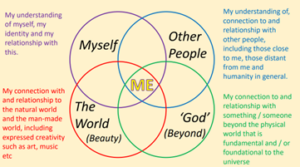Spiritual Development

Spiritual development plays a key role in enabling the achievement of our vision of Love Learn Shine. Our commitment to nurturing each child as an individual involves a strong commitment to nurturing their spiritual growth and development.
Spiritual development should define and influence all areas of life. It concerns enabling the innermost essence of each individual to grow and thrive in order to become the best versions of ourselves we can be enabling us to enjoy life in all its fullness.
Love
Love and a strong sense of belonging, are the foundation of our school community’s life. We want everyone to know and feel they are nurtured, precious, unique and loved by God.
Learn
Children should be inspired to develop a lifelong love of learning; to empower them to explore new paths and make informed choices. We are ambitious that all children become, fluent confident learners, who seek out wisdom, knowledge and skills that guide, inspire and prepare them well for life in a diverse world.
Shine
Every person has something that only they can offer. Every member of our school community is continually encouraged to shine, as only they can, enabling themselves and others to flourish in the light and love of God.
“The light shines in the darkness and the darkness has never put it out”
(John 1.5)
Our vision translates directly into our curriculum in that;
Our approach to the spiritual development of children, families and staff promotes a love and appreciation of life enabling, children to SHINE, realise a passion for what is possible and share and shine their light.
Our Shared Understanding of Spirituality

Because it is a deeply personal experience it is very difficult to put into words what ‘spirituality’ actually is. It differs from person to person, and often spirituality changes within people during their lifetime. Spirituality is not the same as or linked to having a religion or faith or having a religious experience; a person can be spiritual or experience spiritual moments without having a particular faith or religion.
As a school, we have thought carefully about what we feel spirituality means to us and have developed the following agreed definition.
Our agreed understanding of spirituality is:
“Spirituality is not something we can see; it is something we feel inside ourselves. For us it is about, asking, thinking about and reflecting on big* questions and being aware of something ‘bigger’ outside of ourselves. It is about the relationship we have with ourselves, others, the physical world, and the world beyond the physical. Spiritual experiences or moments shape and deepen our understanding of ourselves and helps us make sense of all around us and be at peace.
*Our agreed understanding of a big question is a question is a question that prompts deep thinking and discussion of belief, ideas and understanding. The purpose is to elicit thought and discussion rather than a particular final answer. For example, in Science, children may consider. ‘Bees can hurt us, are bees our enemies?’

Rebecca Nye Model
Aims and Purpose
The Primary National Curriculum provides aims and purpose for all subjects. Spirituality and spiritual development are not directly referenced or planned for within the National Curriculum and therefor there are no pre-determined or agreed aims and purpose. To provide clarity and focus the following aims and purpose have been agreed.
Quality First Curriculum Implementation of Spirituality
Subject Based Curriculum Approach
In each phase team planning will identify at least one big question from a curriculum subject that provides purposeful exploration of aspects of spirituality each term.
Worship Based Curriculum Approach
Thursday worship will have a particular focus on spirituality. This is typically a classes based worship lead by the class teacher. The Headteacher will also lead the worships with induvial classes on a rota basis in the lower hall.
Spirituality Worship Master Slides 2024-2025
Impact
Impact will be assessed considering the four main aspects below.
Shining Spiritually
Progression in Spirituality St Peters
Inclusion
For children with SEND, access to the learning in this subject in lessons may need to be differentiated and scaffolded, whilst the planned, progressive curriculum content is retained. Children are supported to succeed through:
For children with very high needs, they may require additional resources such as time to discuss own ideas with a trusted adult before listening to those of others. A social story may be used to support the idea of different people having different ideas. They are supported with additional teaching assistant time that is proportioned to enable children to succeed in RE whilst promoting independence.
Essential Characteristics of Spirituality
A feature of our curriculum design is the use of Essential Characteristics. These are the learning characteristics developed through the subject overtime. They act as a common thread between all the units studied in a subject and are developed from Early Years to Year 6.
In Spiritual Development they are;
| Encountering
Learning about Life |
Growing and appreciation of the tangible (natural world) and intangible e.g. truth and love. |
| Reflecting
Learning from Life |
Searching for meaning and critical reasoning.
A thorough engagement with a range of questions about the meaning and significance of existence. The ability to ask and answer significant and highly reflective questions. The ability to think for themselves and take the initiative in, for example, asking questions, carrying out investigations, evaluating ideas and working constructively with others.
|
| Transforming
Learning to live life |
Responding as a means of expressing the need to understand purpose
Opportunities for originality, imagination or creativity. |
Spiritual Development Threshold Concepts
A further feature of our curriculum design is Threshold Concepts. Threshold Concepts are the ‘big ideas’ that shape children’s thinking within each subject. The same Threshold Concepts will be explored in every year group and children will systematically build their understanding of them. An important principle, is that exploring concepts will never be complete; children will continue to explore them for as long as they continue to study the subject or aspect.
In Spiritual Development they are;
| Self | Awareness of themselves and their inner person and the way this shapes their ideas, thoughts and views of themselves and a unique human. Reflect on the relationship they have with themselves. |
| Others | Awareness of the concepts of others including empathy and compassion to others. Reflect on their relationships with others. |
| World | Awareness and experiences of the natural world and the results/impact of human creativity its beauty and the relationship between self and world. |
| Beyond | Awareness of the concept of beyond and a growing understanding or relationship with exploring experiences beyond the everyday. Searching for meaning in their experience and their place in the greater scheme of things. |
Monitoring & Assessing Progress of Spiritual Development
By progress, we mean children knowing and remembering more. They key question we ask is; ‘has a child really gained the knowledge to understand the key knowledge and concepts?’’.
Assessing children’s progress is vital in order to establish their acquisition of knowledge and skills in order to build confidence and fluency.
At St Peter’s learning always starts with the children’s prior knowledge and any misconceptions they may have. Class teachers decide upon the most appropriate age-related way of obtaining the children’s prior knowledge. Misconceptions that arise throughout the unit are identified and addressed appropriately by the teacher.
We track progress through teacher judgement, supplemented by frequent low stakes knowledge recalls (often in quiz format) and occasional formal tests to ensure knowledge is recalled and children are genuinely building upon secure prior knowledge.
In addition to assessing if children have secured the agreed key knowledge, ‘Milestones’ related to the Threshold Concepts are used to assess children’s understanding and progress. Systematic planning of opportunities to learn and practise the knowledge and skills of each Milestone is built into each subject planning overview.
At the end of each unit or sequence taught the class teacher will summarise the security of children’s knowledge using our narrative assessment form. This will also identify any gaps in knowledge as well as the steps that will be taken and when to address these gaps. These narrative summaries are also then used before starting future units to provide clarity on the security of the related prior knowledge.
